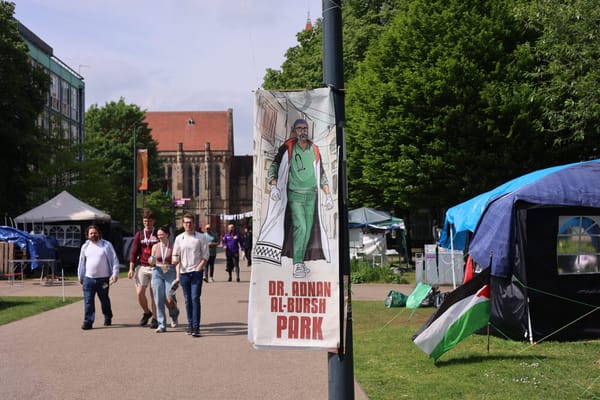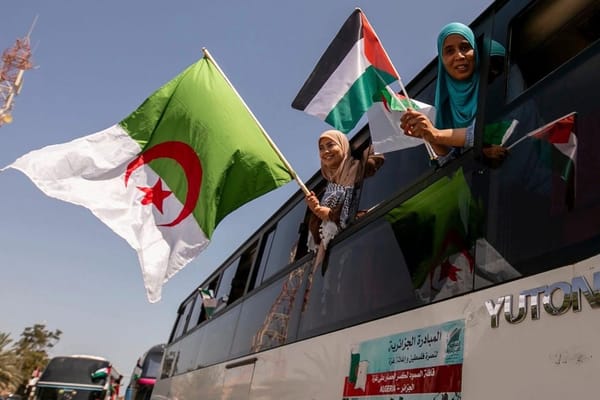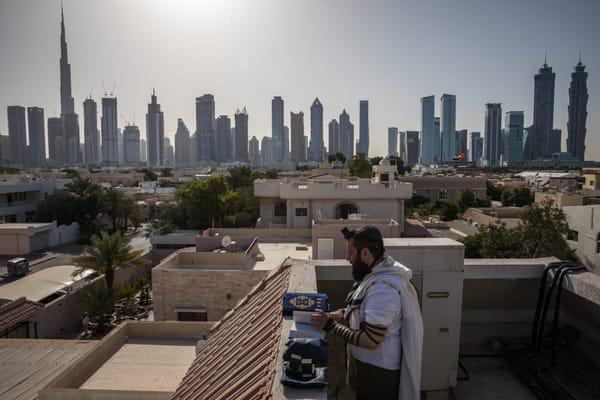Refusing the New Normal—An Interview with the Gulf Coalition Against Normalisation


MER’s Summer/Fall issue examines the material underpinnings of normalization five years after the Abraham Accords and amid the ongoing genocide in Gaza—developments rejected and contested by peoples across the Gulf.
The Gulf Coalition Against Normalisation (Gulf CAN), founded in 2019, unites groups across the region to coordinate campaigns, boycotts and political education against complicity. By linking local initiatives into a shared front for Palestinian liberation, Gulf CAN highlights the material politics of normalization—through universities, trade, infrastructure and everyday consumption—and the forms of contestation against normalisation emerging in response. MER editors interviewed Gulf CAN representatives by email in August 2025.
MER: What is the Gulf Coalition Against Normalisation (CAN)? How and when did it come together? How is it distinct from—or connected to—various anti-normalization efforts across the Gulf?
Gulf CAN: Gulf CAN is a coalition of various anti-normalization groups in the region, including BDS Kuwait, Qatar Youth Opposed to Normalization (QAYON, which has since been shut down by the authorities), the Bahraini Society Against Normalization with the Zionist Entity and the Youth for Al-Aqsa-Gulf Committee. In addition to these organizational members, Gulf CAN also accepts individual members from across the region. It was established in 2019, building on the momentum of the anti-normalization conference held in Kuwait in November 2017 in coordination with BDS Arab Region committee. Its leading aim is to build regional solidarities and collaborations in support of the Palestinian struggle for liberation and confront the threat of normalization with the occupying entity in the Gulf states. It is, therefore, more of an umbrella for various anti-normalization efforts across the Gulf, to share experiences, expertise and efforts towards a common cause.
MER: How has the genocide in Gaza shifted the landscape for Palestine solidarity in the Gulf?
Gulf CAN: The genocide in Gaza has made glaringly clear the extent of complicity of many of our governments—whether through silence or through their continued business dealings with institutions that directly support the genocide. We have always argued that the GCC market offers a strategic space for economic boycott mobilizations. When large companies are forced to choose between the GCC and Israeli markets the GCC market often holds more economic value. Accordingly, most organizations under the coalition have coordinated with BDS on significant campaigns. One notable example is BDS Kuwait’s 2014 campaign against Veolia, the French multinational corporation that helped build and operate the illegal Jerusalem light rail. The campaign resulted in the company losing a $750 million contract and eventually withdrawing from the Israeli market to avoid further losses.
Early in the genocide, people were protesting daily, even in places like Qatar, where getting approval for such protests is impossible. These efforts were grassroots-led with little coordination via local bodies. As time passed, however, more and more restrictions were imposed. For example, QAYON was shut down due to its coverage of these protests. This resulted in more people seeking Gulf CAN as an alternative space to voice their protest. As the governments encroached more on local organizations and outspoken individuals, Gulf CAN’s importance became more evident.
MER: Can you tell us about Gulf CAN’s key campaigns? What have been your successes and main challenges or obstacles?
Gulf CAN: One of the coalition’s primary roles is to bring together people from the Gulf—activists, scholars and youth—who are seeking ways to resist normalization. When the coalition was first established, we launched a series of lectures and talks aimed at raising awareness and making it clear that citizens across the region, regardless of their governments’ positions, stand united in opposition to the Zionist entity.
One of the coalition’s primary roles is to bring together people from the Gulf—activists, scholars and youth—who are seeking ways to resist normalization.
In 2022 we began coordinating boycott campaigns across the various Gulf states. For example, five writers from Kuwait and Oman heeded our call to withdraw from the Emirates Airlines Literature Festival in 2022 over the participation of an Israeli author. Another campaign targeted the Bahrain International Show in 2022, which regularly features Israeli arms companies. As a result, an Omani airline pulled out of the event and a Kuwaiti bank removed its name from the list of sponsors. This was especially important at a time when the Gulf crisis (the blockade of Qatar between 2017–2021) had created rifts across the region, and the Palestinian cause was being instrumentalized by different sides. We sought to present a common voice: Regardless of where you are, the struggle is one, and we must learn from one another’s experiences.
Among a set of projects we are running at the moment, the Boycott UK Universities Campaign (BUUK) has recently been given focus. Since September 2025, we have also been cooperating with the Global Sumud Flotilla GCC team and started a campaign calling for the boycott of the Manama Dialogue event [an annual international security summit held in Bahrain and funded by the Bahraini government] for its continuous inclusion of Zionists.
MER: Can you talk us through the UK Universities campaign? What are its targets, goals or demands? What modes of organizing and campaigning are you using? What has the response been?
Gulf CAN: Before answering this question, we must acknowledge that MERIP has editorial staff who are based at a university that is complicit in the genocide in Gaza: The University of Exeter is partaking in the ongoing genocide in Gaza by insisting on maintaining ties with companies supplying the Israeli military with weapons. Our participation in this issue should by no means be considered an endorsement of that institution. The University of Exeter is not currently listed among the boycotted universities because the campaign is currently focused on ten universities with high Gulf student enrollment. But that does not mean it will remain excluded. We recommend listening to our seminar “Gulf Students at the Encampments” from October 2024 (in Arabic).

The broader campaign for boycotting UK universities emerged from the participation of Gulf students in the student encampments across UK campuses. These students felt compelled to act against funnelling money to complicit institutions, realizing that their tuition fees could be invested in the military-industrial complex fuelling the genocide in Gaza. Our research revealed that, in many cases, the revenues UK universities make from the enrollment of GCC students exceeds what they earn from financial partnerships with complicit companies, such as Leonardo S.p.A, BAE Systems, Thales, QiniteQ and the UK Ministry of Defence (MoD) (more evidence can be found here). Therefore, a coordinated boycott of institutions with large GCC student populations could strengthen the stance of the student movement in the UK in its fight for cessation of ties with military actors conducting the genocide.
The universities we focus on in our campaign have partnered with companies and agencies that profit from the genocide. These universities have exercised violence and punishment against their own students who protested against the universities’ complicity in protecting their stakes in the genocide. These universities were all listed among the 82 UK universities who were served a formal alert by the International Centre for Justice for Palestine (ICJP) about potential criminal liability over investments in arms companies and Israeli settlements.
Based on the above, Gulf CAN issued a notification of boycott to the following ten universities: Newcastle University, University of Manchester, University of Liverpool, Queen Mary University of London, University of Nottingham, Northumbria University, University of Portsmouth, University of Leeds, Manchester Metropolitan University and Coventry University. As part of sustaining and expanding the campaign, we are monitoring other complicit universities. We have already garnered pledges from prospective students, threatening targeted universities with an estimated £24 million in potential revenue loss. This amount could escalate as the campaign continues to spread within local communities in the Gulf. The longer universities insist on maintaining lethal partnerships, the more they risk foregoing a vital source of funding.
In the UK, the campaign has joined forces with—and is guided by—the student movement as well as various actors and coordinators. It has also been mobilized by a wider group of actors. We would particularly like to pay tribute to Palestine Action, who, over the past two years, have organized a series of powerful actions against the University of Liverpool, University of Manchester and others for their complicity in the genocide and occupation of Palestinians. We have watched with great distress as Palestine Action was proscribed as a terrorist organization [in July of 2025]—a move international human rights organizations, such as Amnesty International, called “a disturbing legal overreach.” The use of fascist methods by Western governments continues to erode the image of their higher educational spaces as an attractive option for Gulf students.
MER: How does the campaign target UK universities in relation to the globalized higher education sector?
Gulf CAN: From the outset, it was clear that the UK higher education sector—heavily dependent on international student revenue—was already in a vulnerable position. Many GCC states, however, remain biased in their scholarship and funding schemes toward Global North institutions. An unintended yet significant consequence of this campaign is its challenge to the assumptions underlying these national scholarship programs: What kinds of educational experiences are we offering our youth, and from whom?
The myth of academic freedom, so often touted by Western institutions, has proven to have clear limits when it comes to Palestine.
The genocide has laid bare the hypocrisy of these so-called liberal institutions—not only through their unethical investments but also through their repression of students and scholars who dare speak out against the genocide. The myth of academic freedom, so often touted by Western institutions, has proven to have clear limits when it comes to Palestine. We hope this campaign will encourage critical reflection among students and parents alike: Where do I want to study, and from whom do I want to receive my education?
MER: How does Gulf CAN situate itself within the broader landscape of the Palestinian liberation struggle in the Gulf? What are the key targets or pressure points for the anti-normalization struggle in the region?
Gulf CAN: As we mentioned earlier, Gulf CAN emerged from conversations at the 2017 anti-normalization conference in Kuwait. At the time, we believed it to be the first of its kind—only to later discover that a similar conference had taken place in Kuwait in 2000 under the title “The Popular Conference to Resist Normalisation with Israel” (المؤتمر الشعبي لمقاومة التطبيع مع إسرائيل). This is often the case: much of our current work builds on past efforts, whether we’re consciously aware of it or not. Many of the founding groups are rooted in historical spaces. For example, BDS Kuwait is housed within the Women’s Cultural and Social Society, established in 1963, which has historically supported—and now continues to support—the Palestinian liberation struggle.
MER: How do you navigate differences across Gulf states in their stance toward normalization and in the political space (or lack thereof) available for organizing?
Gulf CAN: We are currently revising our bylaws in light of the normalization agreements signed by Bahrain and the United Arab Emirates in 2020. In Gulf countries that have signed normalization agreements, our focus is on exposing their dangers and supporting efforts to challenge and end them—see for example this seminar we hosted (in Arabic). In countries that have not entered normalization agreements, our focus is on opposing any measures that pave the way for such agreements.
Work on the ground varies from one context to another, and even within the same country conditions can shift overnight. As we have seen in Kuwait with the suspension of parliament, which has impacted civil life in Kuwait, including our founding organization member BDS Kuwait. What is possible in one moment may lead to imprisonment in another. One of the key reasons Gulf CAN was created was to offer a platform for individuals in countries where no local anti-normalization organizations exist due to severe restrictions on civil society. We wanted to ensure that anyone, anywhere in the Gulf, could find a space to express dissent and contribute to coordinated campaigns that could take root in any of the GCC states.
Gulf CAN, "Refusing the New Normal—An Interview with the Gulf Coalition Against Normalisation," Middle East Report 315/316 (Summer/Fall 2025).








